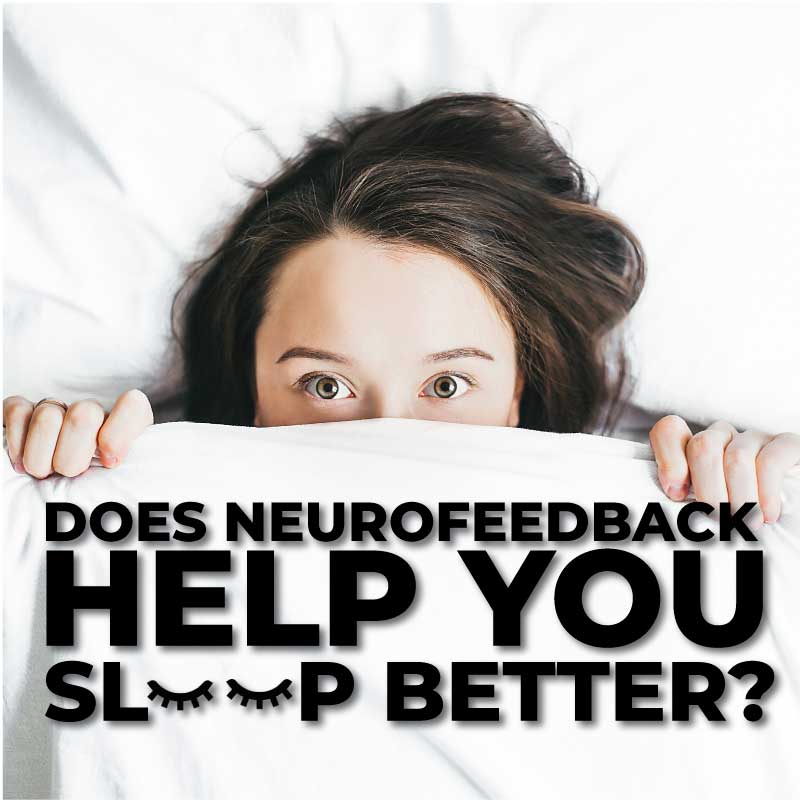Does neurofeedback help you sleep better?

Does neurofeedback help you sleep better?
“Sleep is the best meditation.” Dalai Lama.
Did you sleep well last night? If your answer is yes, I can guess that you are having a much better day than if you had tossed and turned all night, unable to catch some z’s. The quality of our sleep affects our attention span, focus, memory, and overall mood. The importance of high-quality sleep cannot be overstated.
Rest Is a Housekeeper
Sleep appears to play a “housekeeping” role in our brains. It helps remove toxins that build up while we are awake. So no sleep = no toxin clearing. It makes sense, then, that you wake up feeling grumpy and unfocused if you do not sleep well.
Kids who do not get quality sleep have a challenging time waking up and getting ready for school without stress and difficulty. Parents often report that their mornings include multiple meltdowns, arguing, and uncooperative behaviors.
An occasional poor night of sleep can bring some unwanted backtalk and crankiness from your child. But consistently poor sleep can affect the child’s school performance, mood, and peer relationships. If the child already shows signs of poor focus, inattentiveness, or mood swings, then disrupted sleep quality can make his or her behaviors even more pronounced. If your child struggles during the day, it may be time to take a closer look at the quality of their sleep.
Neurofeedback and Healthy Sleep Hygiene
Sleep hygiene refers to the habits and behaviors that promote healthy sleep patterns. Most of us already know many of the positive habits for good sleep. Some of the most significant contributors are:
Limiting the use of electronics and screens at least an hour before bedtime
Going to bed and getting up at consistent times each day
Restricting your consumption of caffeine and alcohol
Keeping your bedroom cool and dark for sleeping
Hopefully, you already are practicing these things or are prepared to start now. However, if you are following all the typical recommendations and still can’t sleep, NeurOptimal®l can help. NeurOptimal® neurofeedback promotes sleep management as part of a healthy lifestyle of holistic wellness. Given the link between poor sleep and disorders such as depression, we know that as your sleep improves, so do the other areas of your mental health.
One of my clients was a ten-year-old boy whose mother was concerned about him being spacey and unfocused at school. This behavior was affecting his school performance and grades and creating much frustration for the boy and his mom. His doctor said he didn’t fit the typical ADD/ADHD diagnosis, so she brought her son to me for some brain training.
After the family filled out the initial “Checklist of Concerns,” I noticed that in addition to his poor focus, sleep also presented as a concern. After a handful of neurofeedback sessions, his mom noticed that their mornings were a lot smoother for the family. She reported that it was easier to wake up her son and that he was happier and much more cooperative getting ready for school.
His focus and attention in class were improving, too. His mother was thrilled that they did not need to use prescription medication to force his brain to focus while ignoring the fact that his sleep was a problem. When our brains get quality rest at night, they naturally have a higher potential for performing well during the day.
Give NeurOptimal® Neurofeedback a Try.
When you're ready for a different level of support, NeurOptimal® neurofeedback may be just what you need. Contact Beaverton Neurofeedback today to schedule an appointment. We can’t wait to help you and your family thrive on your wellness journey.




